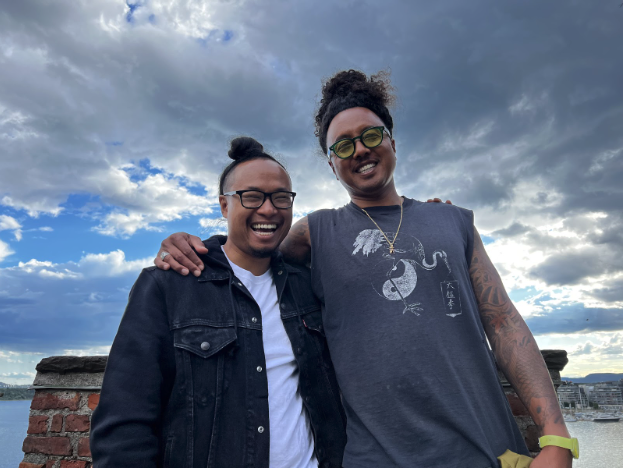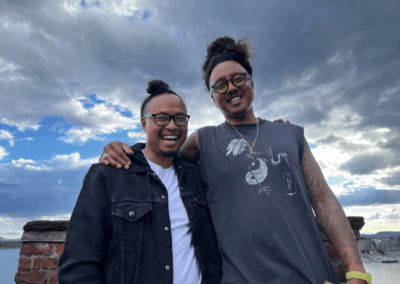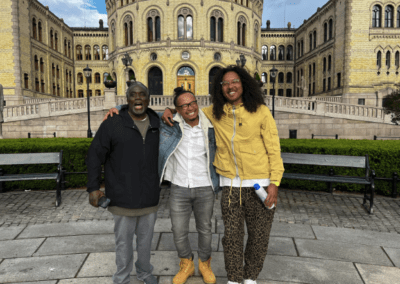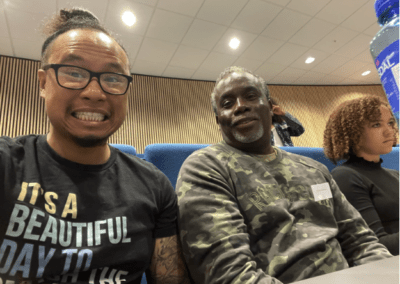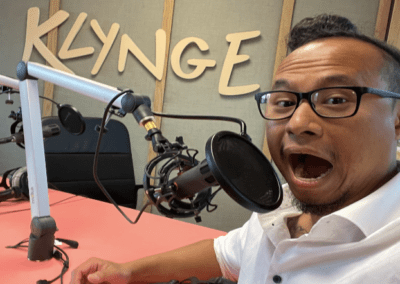Thanh Tran
Released after 6 years
Diane: Start when your sentence was commuted.
Thanh: In January, the governor commuted my sentence. He said, “This person deserves a second chance to be in society.” I went in front of a parole board to argue my case, that I am a rehabilitated human being and not a threat to society. However, I wouldn’t have the chance to get out until next year at the earliest, if all things worked out. The District Attorney of Santa Clara said, “You know what? Thanh deserves to be out right now.” He resentenced me to 1170D,” which is basically resentencing for a myriad of reasons, but in my situation, it was for good conduct. It was May when I got resentenced, and literally two weeks later, I was kicked out the door.
Diane: Tell us about your release.
Thanh: I got my box of clothes, and as I’m changing out they were like, “Hey, you actually have to do a rapid Covid test real quick? You know, I’m floating, I’m joyous, I’m out of here, this is the win, I’m ecstatic. I go into this Covid test and I’m like, “This is nothing, I don’t feel sick. I should be good. They were like, “Hey, you have Covid! As a matter of fact, we recommend that you’re sent directly to a hotel. We don’t recommend you go back to your family.” I was like, “Woah, this is crazy to make these last-minute adjustments right when everyone is outside at the gates for me.” I wasn’t sure what to do. I called my partner, “What do you think is the right move?” They’re like, “Give Thanh back to us – we want him back right now. We’ll take care of him.”
Diane: Were you nervous the night before? Did you sleep?
Thanh: No, I didn’t sleep at all. The night before I was released, I stayed up all night talking to my bunkie, my closest friend. We talked about our plans, our goals, we talked about basically everything I was going to do when I’m free. I think somewhere around three I must have passed out. Two hours later, I’m fully dressed and ready to go. I’m ready for the CO to pop the cell and let me out because I’m ready to go home. 10 ½ years was plenty for me.
Diane: How were the officers when you were leaving?
Thanh: The officers were all very cordial. They were all business, making sure I was the person that was supposed to be getting released. I must have had my name and CDCR number checked seven times on the way out. When they told me I’m Covid positive, they made me double-mask up, double-glove up. I kinda looked like one of those guys who kidnapped ET. I’m in this hazmat suit, essentially. I got into the van and couldn’t breathe because of this double mask and face shield. Finally, I saw all my family and loved ones and we did this weird dance of – do we hug or not? Some of them said, “Screw it, we’ll quarantine with you,” and gave me a hug. I broke down in tears and cried. I couldn’t believe that it was really over. I’ve been out for two months now, and it still feels shocking to me. Just now, I’m here mopping my foster mom’s house and I’m like, “Damn, I’m really here mopping my foster mom’s house; I’m not in a cage anymore.” It’s still mind-blowing.
Diane: Take us back to your release at the gate.
Thanh: I got in the car with my partner, Lupe, who took me back to Sacramento, and I quarantined with her and my little sister who actually had Covid. It was like a little quarantine party, it was excellent.
Diane: What was your first meal?
Thanh: My first meal was terrible. I was starving. I said, “Let’s just stop and grab some food, so we stopped by Jack ‘N’ the Box. It was greasy as hell. My body was used to eating Top Ramen. I’m not going back to Jack ‘N’ the Box ever again. That was my first terrible meal.
Diane: What was your first good meal?
Thanh: My elderly foster Mom rolled up in the driveway of my little sister’s house with vegetarian food from the temple. I hadn’t eaten that since I was a little kid. It was the best meal ever because one, it was delicious, two, it was healthy and three, it was nostalgic.
Diane: What did she make?
Thanh: She made Bì Bún, white noodles with vegetables and a vegetarian alternative for shredded pork, made of shredded potatoes. It’s all vegetarian and it’s amazing.
Diane: Was your parole officer okay with you going to Sacramento?
Thanh: Actually, my parole required me to go to Sacramento. I wanted to go to San Jose where I have housing. My parole forced me to go to Sacramento and I was like, “Alright, that’s where my little sister’s quarantining anyway, so it wasn’t a big deal. It actually worked out for parole, but now I’m stuck in Sacramento because my parole transfer is not working out.
Diane: What were those first couple of days like?
Thanh: It was wonderful. I was Covid-positive but I didn’t have any symptoms.
I just hung out with my little sister. We were in the house for a week talking and catching up. We played board games. It was beautiful.
Daine: You mentioned you and your cellie talked about your hopes and goals. Have you accomplished any since you were released?
Thanh: There were small goals. I told him, “I want to be at the gates to pick you up,” because he was in the process of getting resentenced himself. He’s supposed to be coming home any day now, as a matter of fact. I also talked about career goals, like doing policy work. I talked about doing music. Since I’ve been out, I officially got hired with the Ella Baker Center for Human Rights. I’m also in the Comm Department doing film work. I’m actually living out those dreams. Those steps are manifesting as we speak. I’m still working on my music goals. Music is a big investment on the front end financially before you ever see any returns. I was on the San Quentin Mixtapes if you ever heard of that. I sing and I rap…kind of like some Drake-type vibe. I rap about love, relationships, hustlin,’ grindin,’working hard for what you deserve. I rap about things I experienced on the streets and about how you have to be above that stuff. I don’t rap about guns, I don’t rap about selling drugs, I don’t rap about violence, none of that stuff. I’m trying to invite people to go a different way. I’m trying to give people motivation – like, “Go get a job, bro!”
Diane: Did you experience any transitional shock?
Thanh: They’re so many things that shocked me, like driving. I was tripping out- people are such dangerous drivers. I remember when my little sister helped me set up a TV in my room. We had a remote controller, she hit the little microphone button to start talking to it and it shocked the shit out of me. I was like, “Hold on! How long have you had this technology?” The youth shocked me. Being around my nieces and nephews, talking to them about their struggles and what culture is like for them. Lots of exclamation points behind the shock.
Diane: What do you look forward to doing?
Thanh: The thing that I enjoy the most is doing absolutely nothing. I like it when I’m not busy because usually I’m super swamped, taking calls, meetings, etc. I commute at least once or twice a week between the Bay and Sacramento, so I like just being at home and watching TV, being with my little sister and talking crap!
Diane: How has the process of rejoining society been?
Thanh: I feel that I’m blessed and have had a lot of support in a lot of ways. Reentering has been fairly seamless. As for discrimination, when I opened a bank account, they were like, “Why don’t you have credit? All I had was my driver’s license and my prison I.D. Why this, that and the other?” I was like, “Alright, I was imprisoned.” There was no way to get around it. Immediately, the treatment was different. Immediately, I could tell that the bank teller was not feeling me. He was curious. He asked a lot of prying questions. He was like, “Man, what were you in prison for? “Well, what do you need a bank account for? Can you tell me what you’re going to be spending money for? You’re not selling drugs, are you? Is this account going to be used for drugs?” I was like, “No, dude! What the fuck?” Everything was cool until I said I was imprisoned. I switched banks immediately. The word “important” doesn’t highlight how pivotal having credit is in our society. I feel like that’s another struggle I’ve been going through, just trying to figure out how to get my credit right. I’d like to think I’m a fairly intelligent guy, and I’ve been really struggling making a bunch of calls. The average incarcerated person has a very low education level. A person who is illiterate or something – how are they supposed to reenter society, get their credit and be able to navigate all this bureaucracy without assistance?
Diane: What other parts of society surprised you?
Thanh: A good thing I’ve noticed is people are a lot more conscious and thoughtful, especially in the language around the LGBTQ community and people of color. There’s still a lot of bigotry of course, but it’s refreshing to see people care, they are trying. I don’t always get the pronoun stuff right; I’m still figuring it out. A thing that surprised me negatively is the amount of homelessness. In Sacramento, all the way up and down the freeway ramps are a bunch of tents. My family, my mom and my oldest brother are both homeless and addicted to drugs, so homelessness is something that hits me close to home. It’s wild, Sacramento is our state’s capital. This is supposed to be a place we’re proud of, yet it’s like toe up. That was shocking.
Diane: I saw you in Norway when you were recently released. How did that happen?
Thanh: I got invited to Norway when I was still in prison with Uncuffed, the podcast broadcasted from inside San Quentin. I needed to get a passport. My parole to approve it. We needed funding. There were all these moving pieces. Honestly, I didn’t have that much faith that it would work out. But it all came together. I was on a flight to Norway, it was my first time ever on a plane. I’d never been anywhere before my incarceration. I was a gang member. I never really left my block, this small-ass radius in South Sacramento. It was the first time I’d been on a plane, and it was a wild experience, to see a whole new culture and people.
Diane: How was traveling?
Thanh: I think the best way to describe it, there are no expectations on you in any way. You can be your truest self. Nobody knows you and nobody expects you to be a certain way. I don’t have to be anybody the world expects me to be. I can just be Thanh Tran. I can be my goofiest self. I can do whatever. It was a blessing. It was an absolute blessing.
Diane: Did any prisons stand out to you in Norway?
Thanh: Yeah, absolutely. I didn’t know what I was expecting, but I didn’t expect to see so many people suffering. I was kind of Pollyanna in my belief that Norway was the way to go. These are humane prisons and people are happy there. I stepped into the prisons and the first thing the first incarcerated person said to me was, “Brother, help me. They have us on a 22 hour lockdown right now. They’re going to show you a pretty prison, but we’re all slammed all day.” I thought, maybe this dude is trippin, but more people kept coming up like, “Bro, please tell the world that we’re here suffering.” I came to find out that Norwegian prisons are violating Geneva conventions right now. They’ve actually been cited for it and have a bunch of lawsuits against the prison system right now. Ironically enough, they’re still selling themselves as one of the best prison systems to the world. I think that my biggest take away from the Norwegian prisons is that prisons are still prisons no matter how pretty you make them. Suffering is still suffering. We have to create new systems if we want to see a better society, and more humane treatment. It doesn’t matter how pretty you make it, whether you put it on an island, a brewery or a mountain.
Diane: I’m laughing at the brewery. That wouldn’t really suck if you were in a brewery.
Thanh: Right? They turned a brewery into a prison and took all the brew with them, so it was a complete loss.
Diane: What prisons did you visit in Norway?
Thanh: I went to the Oslo prison and Bastøy Prison- that was the island prison.
Diane: Did you have a better experience at the island?
Thanh: There were horses, people riding bikes, a ferry operated by incarcerated people, jellyfish and goats, and it was just bananas. There were officers barbecuing with incarcerated people, officers running a marathon with incarcerated people, they live in little cottages. They live like Little House on the Prairie but in prison. However, the first thing people said when we finally talked to the incarcerated people, “Brother, this is a prison. We’re not happy here. It may look beautiful all around us, but we can’t talk to our families. We can’t leave this island. We’re still being punished. I think another thing that was highlighted when I was at Bastøy Prison: they said there were about 50 incarcerated residents there, and there’s 3000 people in their entire system. That means that only a small percentage of incarcerated people get to experience this nice island resort prison. No matter how nice and plush this looks, this is not accessible to your entire incarcerated population. There’s a rare, small lucky 50 out of 3,000. I kept that perspective in mind.
Diane: Is it true they spend their last nine months of incarceration there?
Thanh: No, there are some people who have been serving a couple of years, but generally it’s for short-termers. It’s the equivalent of a fire camp in California, but it’s on an island with horses, goats and jellyfish.
Diane: Is there anything you want to share?
Thanh: I want to highlight the suffering of the brothers who are still incarcerated right now. I want to highlight what learning to live with COVID in prison means – solitary confinement, shutdowns left and right, being infected multiple times. I was infected with COVID three times, and again when I was released. Even though the world found a way to live with COVID, in prisons it means more and more suffering and more and more human dignity stripped away from you.

